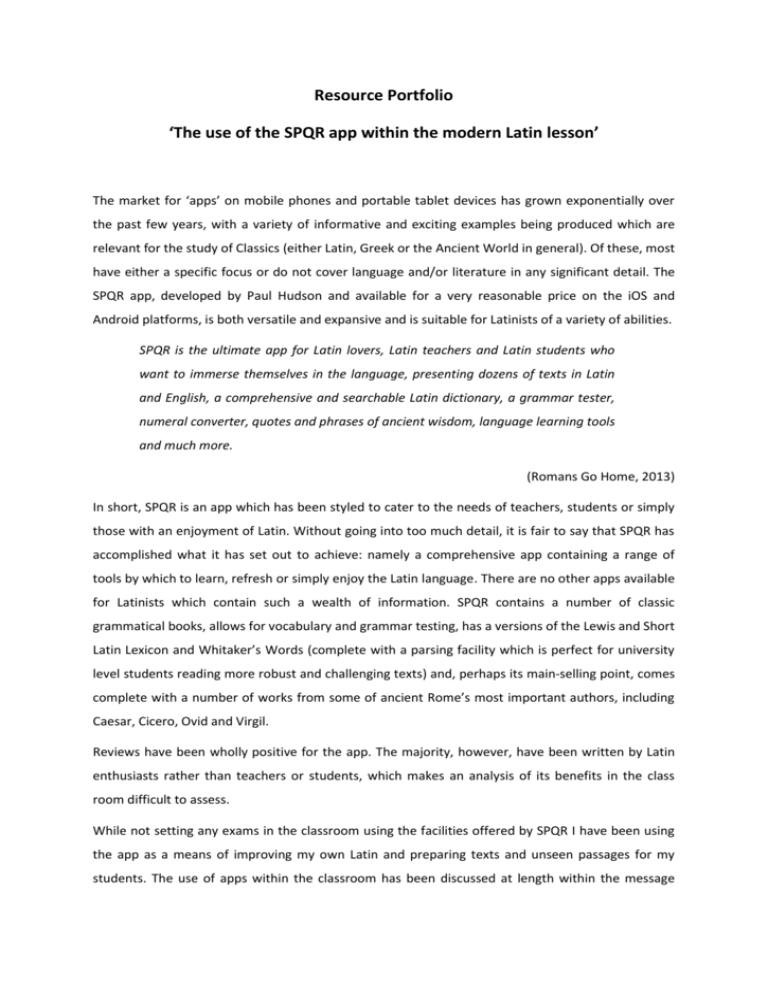Resources Portfolio - Alex Karski
advertisement

Resource Portfolio ‘The use of the SPQR app within the modern Latin lesson’ The market for ‘apps’ on mobile phones and portable tablet devices has grown exponentially over the past few years, with a variety of informative and exciting examples being produced which are relevant for the study of Classics (either Latin, Greek or the Ancient World in general). Of these, most have either a specific focus or do not cover language and/or literature in any significant detail. The SPQR app, developed by Paul Hudson and available for a very reasonable price on the iOS and Android platforms, is both versatile and expansive and is suitable for Latinists of a variety of abilities. SPQR is the ultimate app for Latin lovers, Latin teachers and Latin students who want to immerse themselves in the language, presenting dozens of texts in Latin and English, a comprehensive and searchable Latin dictionary, a grammar tester, numeral converter, quotes and phrases of ancient wisdom, language learning tools and much more. (Romans Go Home, 2013) In short, SPQR is an app which has been styled to cater to the needs of teachers, students or simply those with an enjoyment of Latin. Without going into too much detail, it is fair to say that SPQR has accomplished what it has set out to achieve: namely a comprehensive app containing a range of tools by which to learn, refresh or simply enjoy the Latin language. There are no other apps available for Latinists which contain such a wealth of information. SPQR contains a number of classic grammatical books, allows for vocabulary and grammar testing, has a versions of the Lewis and Short Latin Lexicon and Whitaker’s Words (complete with a parsing facility which is perfect for university level students reading more robust and challenging texts) and, perhaps its main-selling point, comes complete with a number of works from some of ancient Rome’s most important authors, including Caesar, Cicero, Ovid and Virgil. Reviews have been wholly positive for the app. The majority, however, have been written by Latin enthusiasts rather than teachers or students, which makes an analysis of its benefits in the class room difficult to assess. While not setting any exams in the classroom using the facilities offered by SPQR I have been using the app as a means of improving my own Latin and preparing texts and unseen passages for my students. The use of apps within the classroom has been discussed at length within the message boards of the TES online community (TES Community, 2013; Jacques L. A., 2013) and across the internet and there appear to be many arguments both in favour of and against allowing children to use iPads or other tablet devices during lessons. In the context of a school which allows the use of tablets and apps, the SPQR app could be a valuable tool for teachers wanting to create grammar or vocabulary tests for pupils. The app contains numerous vocabulary flash cards grouped in sets of 100 cards ranging from ‘Beginners 1-5’ to ‘Advanced 1-10’ and it is possible to create flashcard sets from the authors on the app itself. This is a valuable tool for any teacher wishing to test students on the vocabulary found within set texts, assuming the text currently covered in the OCR or WJEC syllabus is to be found on the app. Unfortunately, Cicero’s in Verrem is not currently available on the app, for example. The grammar section on the app allows for multiple choice tests, matrix selection tests, form conversion and several other options. An exam function is also available and is designed ‘to let teachers create quick Latin tests that assess student learning at a group level.’ The app advises that this testing can be done with a single copy of the app, with the teacher creating and printing off papers for students; or with multiple copies and each student using a specifically generated code for the exam set by the teacher. One of the most obvious drawbacks to the app is the lack of any affiliation with OCR or the Cambridge Schools Classics Project which limits the app’s use. In principle SPQR has a variety of functions which would translate incredibly well into the classroom and allow for comprehensive Latin assessment for teachers but because the OCR GCSE or A-Level vocabulary lists are not available the app can easily be overlooked in the classroom in favour of traditional vocabulary tests set by teachers. Alternatives such as Memrise (Memrise 2010) are able connect users in online groups based on individual tests (such as vocabulary arranged by Set Text or CLC Stage, for example). I have used this app since it was first released on the iOS platform for personal use and have always found it to be easy to use and very useful for improving my own Latin while reading texts or using the in-built lexicon. While initially I was convinced that it would be relevant within the context of teaching Latin in a class it has become apparent that not all classrooms would be either equipped for the use of apps and it may just not be appropriate to use apps in some, depending on the maturity of the students and the schools’ policy on phone use in class. However, should the developers of the app look towards collaboration with either OCR and/or one of the Latin course providers (ideally CSCP and the CLC) the app would achieve a greater dominance in classroom teaching. Yet it is likely that the CSCP would prefer to invest in apps dedicated to the tuition of the CLC or further invest in their online and CD-ROM versions of the course. It is unlikely that such collaboration would ever come about. SPQR does tailor to a wider audience in many respects and offers possibilities for teachers to create their own syllabus or augment existing structures to enhance the education of their students or at the very least improve their own knowledge and understanding in a very modern, accessible and relevant manner. 991 words Bibliography Jacques L. A. (2013) Using Applets for Inquiry. The Mathematics Teacher, Vol. 107, No. 5 (December 2013/January 2014), pp 386-388 Memrise (2010) www.memrise.com [online] 2013 Available at: http://www.memrise.com/ [Accessed 29/11/13] Romans Go Home (2013) www.romansgohome.com [online] 2013 Available at: http://www.romansgohome.com TES_community (2013) http://community.tes.co.uk/ [online] 2013 Available at: http://community.tes.co.uk/tes_resources/b/weblog/archive/2013/09/26/26-ways-to-usemobiles-in-the-classroom.aspx






